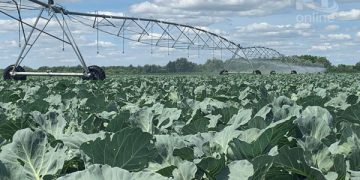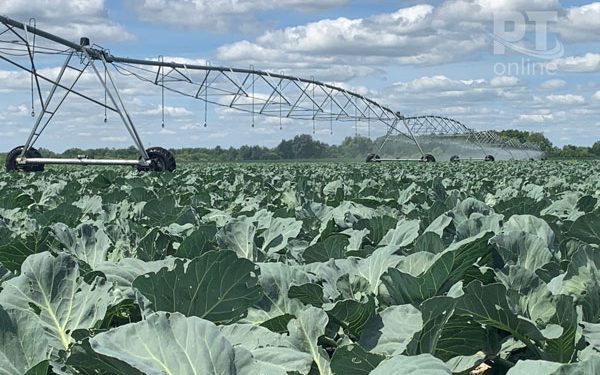In the Soviet years, the leaders of the country and regions paid great attention to the development of land reclamation. However, by the end of the last century, the irrigation system practically ceased to function, the construction of new and repair of old reclamation systems stopped, most of the sprinkler machines were disposed of.
The frequent cases of drought at the beginning of the new millennium accelerated the solution of land irrigation issues. More about this – in an interview with the director of the federal state budgetary institution “Tatmeliovodkhoz” Mars Hismatullin.
– Mars Mansurovich, land reclamation is getting back on its feet and becoming the key to the development of domestic agriculture. How does our republic look against the background of other regions?
– Tatarstan melioration system is recognized by the Ministry of Agriculture of Russia as one of the best in the country. Over the past ten years, we have commissioned 32 thousand hectares of irrigated land, overhauled more than 480 artificial ponds and hydraulic structures built back in the days when the reclamation industry was supervised by the first President of Tatarstan Mintimer Shaimiev.
Tatarstan is a region of risky agriculture, and only land reclamation measures can completely or significantly minimize these risks. At the same time, the republic has a number of significant advantages in the successful development of land reclamation, which are not available in other regions.
Firstly, these are water resources: we have about 10 thousand large and small rivers, as well as more than 880 ponds and hydraulic structures built. The existing reservoirs make it possible to provide irrigation for more than 400 thousand hectares of land.
In addition, all construction units and the system of training qualified personnel who professionally cope with the tasks have been preserved in Tatarstan. A significant advantage is also the presence of an irrigation equipment plant in the Vysokogorsky district, which produces modern circular sprinkler machines. Mars KHISMATULLIN, Director of the Federal State Budgetary Institution “Tatmeliovodkhoz Management”: Regional and federal land reclamation programs can greatly ease the financial burden of farms.
– How can we assess the contribution of Tatarstan meliorators to ensuring food security and food availability?
– Judge for yourself: in the dry 2010, we did not have a crop of all crops, especially potatoes. The republic was forced to import it from Belarus, the Kirov region and other regions of the country. The year 2021 was very similar in climatic parameters to 2010, however, thanks to the measures taken to develop land reclamation, Tatarstan received a potato harvest that was enough to fully provide its own population. The yield for all other crops in irrigated areas was three to four times higher, and the cost price was more than two times lower than usual. In terms of grain crops last year, 10-12 rubles of additional products were received for one ruble of irrigation costs, and vegetable crops – more than 30-40 rubles.
– Undoubtedly, irrigation increases the profitability of agribusiness several times. But what was the trigger for the revival and modern development of land reclamation?
– Of course, unprecedented support programs for farms developing land reclamation. In Tatarstan, there are republican and federal targeted programs that allow you to significantly subsidize the costs of farms. In the presence of design and estimate documentation, farms are subsidized from the budget of the Republic of Tatarstan 100 percent of investments in the construction and repair of hydraulic structures. And this is provided only in Tatarstan.
Also, 70 percent of the costs for the purchase of irrigation and pumping equipment, drilling wells are subsidized from the republican budget, and 50 percent of the costs for laying pipelines are compensated under the federal program. One-time costs for land reclamation are more than recouped in a year. It should be taken into account that the reclamation system will work for at least 20-25 years.
The following figures eloquently indicate how profitable it is for farmers to work on irrigation. Each hectare of irrigation, if it is built from scratch, costs about 200 thousand rubles. Taking into account subsidies of at least 70 percent, the costs will amount to 60 thousand rubles. And from each hectare when growing potatoes, subject to the technology, we receive additional products in the amount of 650 thousand rubles.
If an agricultural enterprise places at least ten percent of the feed wedge on irrigation, then it will provide itself with feed in any year. Even in such dry years as 2010 and 2021.
– How much grain is grown in the republic on irrigation?
– As far as I know, it’s still quite a bit. The first one who came to mind was a farmer from the Tukayevsky district, Mintalip Minnikhanov. Last year, according to the scheme of alternating crops, 38 hectares of grain turned out to be irrigated. From each hectare, Minnikhanov received products worth 60 thousand rubles, and net profit minus all costs amounted to 50 thousand rubles per hectare. That’s the grain economy. As for potatoes and vegetables, he received 496 thousand rubles of net income from a hectare, and in general – about 32 million rubles.
Those who have already “tried out” the programs are trying to continue to develop along the line of land reclamation. In particular, Nasim Davletov, a farmer from the village of Verkhny Takerman in the Menzelinsky district. Using his example, it is clearly possible to demonstrate the economic feasibility of using sprinkler systems. When watering, he received 80 percent of marketable potatoes – 350 quintals per hectare, the rest is a trifle, which, in fact, is not even advisable to dig up. The same with carrots: I received 610 quintals per hectare when watering, and only 64 without watering.
– Mintalip Minnikhanov, Nasim Davletov are well–known farmers throughout the republic. And how easy is it for ordinary farmers to “fit in” with state programs? What should be the scale of the economy in order to pay off the costs of reclamation work?
– The scale doesn’t matter. To join the program, you need a water source – a river or pond. Today, almost 80 percent of farms have access to water and the ability to water at least some areas. You can even drill a well, but it allows you to irrigate only one or two hectares.
Next, you need a project. It is usually ordered from the Tatmelioration Trust Company. Such highly professional personnel work there that the design and estimate documentation prepared by them passes examination at the federal and republican levels without any problems. The costs of project documentation, as a rule, amount to about five percent of the cost of construction and installation work at the facility, while half of the costs are subsidized to farms within the framework of targeted programs.
With ready-made design and estimate documentation, farms can apply for participation in the program. I have been working in the field of land reclamation for more than twenty years and I do not recall a case when an enterprise, having a ready-made project, did not implement it or that someone was “not allowed” into the program. However, in the last two years there have been more bureaucratic delays – first the selection of projects is carried out by the Ministry of Agriculture of Russia, then the Republican Agrarian Ministry… But this disadvantage is more than offset by the benefits of the programs, the main one of which I think is that the Government directly supports farms, subsidizing their costs, and not the banks that issue loans.
By the way, design and estimate documentation is mandatory only for the construction of large reclamation facilities, and in some cases you can do without it. If a person, for example, has a pond nearby, it is enough to buy a motor pump, a hose and install a drip irrigation system. At the same time, our specialists will have to carry out an examination – to what extent the equipment chosen by the farm is rational from an economic and industrial point of view. Last year, twelve berry farmers purchased reclamation equipment for a drip irrigation system and recouped all costs in the same season. For example, Ildar Sitdikov from the farm “Berry Valley” of the Zelenodolsk district receives a wonderful crop on drip irrigation – five million rubles from each hectare.
– What tasks do Tatarstan meliorators face today?
– The plans for the future are very bright – all our main projects have been selected. Within the framework of the republican program, 100 million rubles were allocated for the purchase of equipment. Also this year, 150 million rubles were provided in the republican budget for the reconstruction, construction and overhaul of ponds. But since this limit was not enough, we asked our President for additional limits, and Rustam Nurgalievich (thank him very much) did not refuse and allocated another 50 million rubles. So in December, there will be another additional selection of facilities that subsidize 50 percent of the costs of building a reclamation network through pipelines.
A source: https://rt-online.ru































